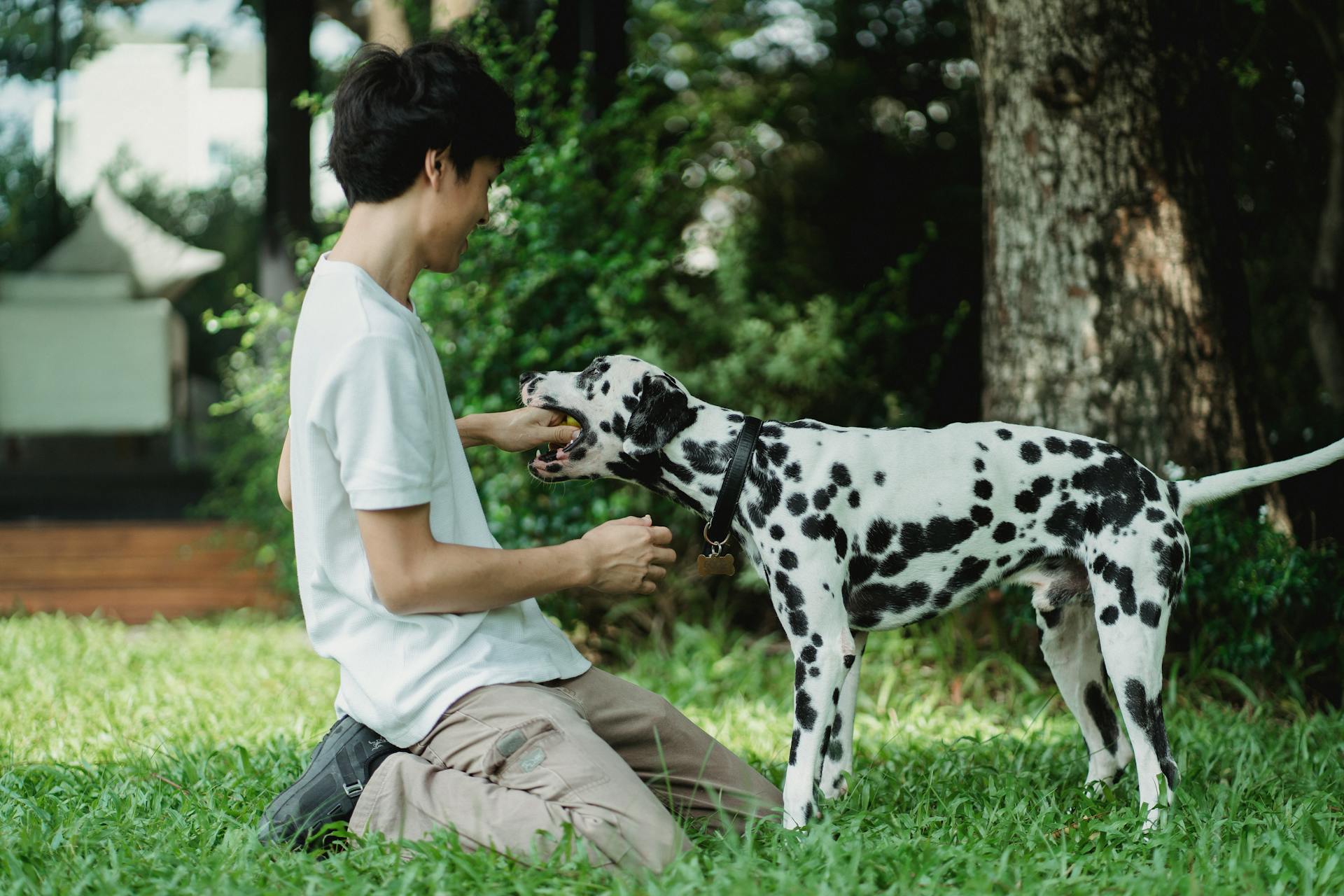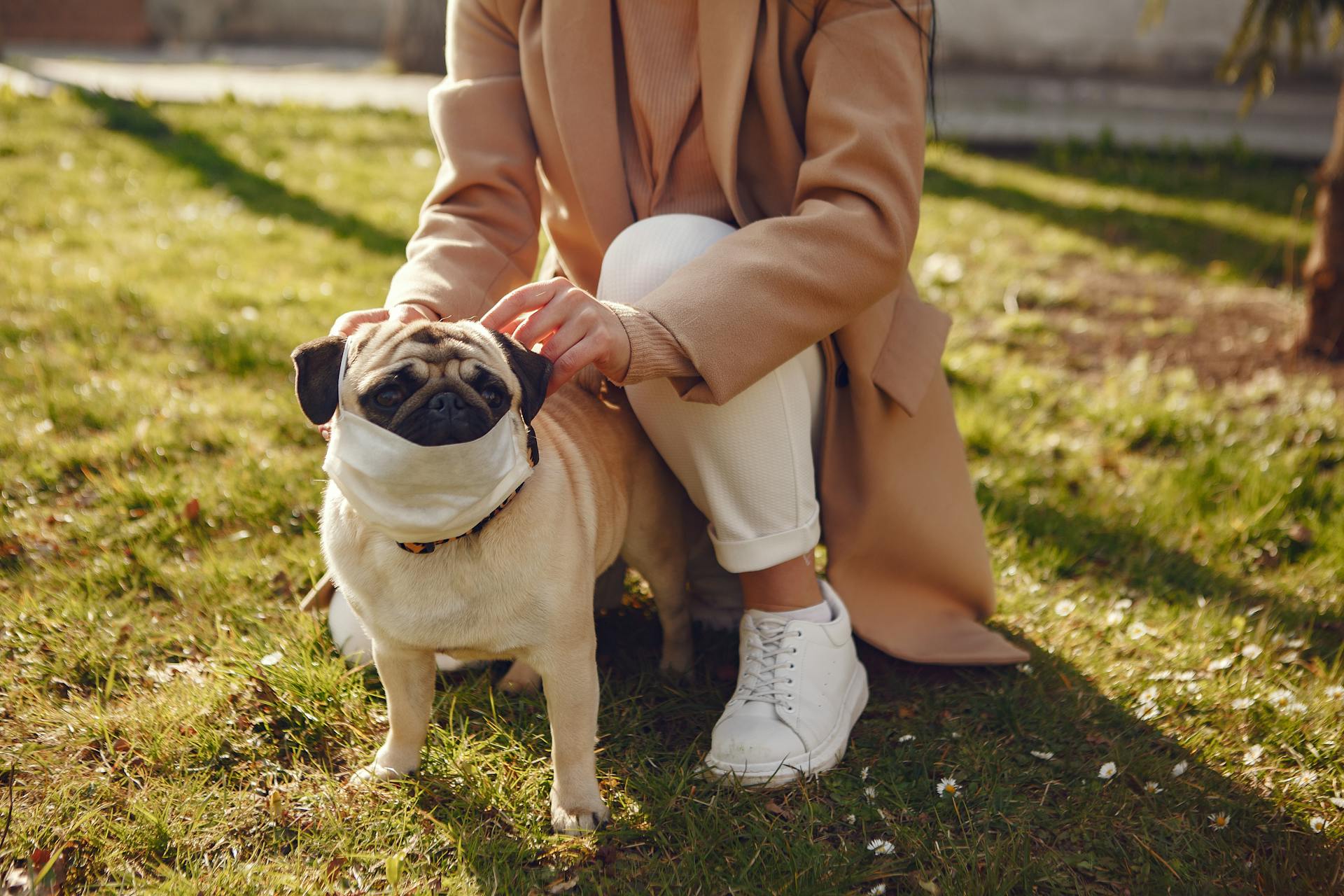
Mouth bleeding in puppies can be alarming, but it's often a sign of a simple dental issue. Puppies are prone to tooth decay and gum disease due to their small jaws and crowded teeth.
Regular dental care is crucial to prevent these issues. Brushing your puppy's teeth daily with a dog-specific toothbrush and toothpaste can help remove plaque and tartar.
Puppies start losing their baby teeth between 3 to 6 months of age, making room for their adult teeth. This process is essential for their dental development.
Proper dental care can help prevent painful dental problems and reduce the risk of mouth bleeding.
Causes and Symptoms
Puppy mouth bleeding can be a concerning issue for many pet owners. One of the most obvious signs is bad breath, which can quickly go from adorable to unbearable.
Puppies may also drool a little more than usual during teething, which can be a sign that their teeth are coming in.
Little spots of blood on toys or other chewed items are a clear indication that your puppy is experiencing some discomfort.
Increased chewing is another common symptom of teething, as puppies try to relieve the pain by gnawing on anything they can get their teeth on.
Here are some common teething symptoms to look out for:
- Bad breath
- Drooling
- Little spots of blood on toys
- Increased chewing
Puppies and Tooth Loss
Puppies start losing their baby teeth around three to four months of age, with the incisors typically falling out first.
It's common to see little blood stains where a puppy chews on things because of this process.
Puppies are notorious for chewing on everything when they are between the ages of three and six months because they are forming their 42 permanent adult teeth.
Most puppies have all of their adult teeth by six months of age.
The bleeding from tooth loss is usually not a cause for concern unless it's impacting the puppy's quality of life or accompanied by signs of blood loss.
Dental Care and Health
Puppies can retain their baby teeth, which can lead to serious tooth problems as they grow. By thirty weeks, your puppy should have their full set of adult teeth, but if there's a baby tooth that hasn't been replaced or your puppy has double teeth, you'll need to take them to the vet.
Small breeds and breeds with shorter snouts have an increased risk of retaining baby teeth. Retained baby teeth make it more likely that your dog will develop canine periodontal disease, which can cause pain and other dental problems.
Puppies that retain their baby teeth are more likely to develop periodontal pockets around their teeth and gum line, which can lead to bleeding, swelling, or masses in their gums.
A unique perspective: Baby Puppys
Why Your Dog's Ear Might Be Infected
Your dog's ear might be infected due to a cut or trauma that exposes the ear to bacteria, leading to a painful and potentially serious infection. This can happen when your dog's ear is hot and the body pumps blood to it, making a small cut bleed a lot.
Infections can also occur if your dog has a disease, such as cancer, that compromises their immune system and makes them more susceptible to infections.
Ear bleeding in dogs can be a sign of an underlying issue, such as a blood blister or aural hematoma, which can become infected if not treated properly.
Importance of Dental Care for Senior Dogs
Dental care for senior dogs is crucial for maintaining their overall health and well-being. As dogs age, their teeth and gums can become more prone to problems.
Senior dogs often show obvious signs of dental disease, such as bad breath and drooling. Their owners may also notice them pawing at their mouth.
During a dental check-up, veterinarians will assess the dog's mouth, lymph nodes, and jaw, and check for signs of dental disease, including bleeding, swelling, or masses in the gums.
Gum disease can lead to periodontal pockets around the teeth and gum line, which can be painful and even lead to tooth loss.
If signs of dental disease are present, veterinarians may recommend at-home dental care and a professional dental clean. In severe cases, surgery may be required to treat and sometimes extract affected teeth.
Small breeds and breeds with shorter snouts are at an increased risk of retaining baby teeth, which can lead to serious dental problems later in life.
Here are some common signs of dental disease in senior dogs:
- Bad breath
- Drooling
- Pawing at the mouth
- Bleeding or swelling in the gums
- Periodontal pockets around the teeth and gum line
Treating Dog Ears
Your veterinarian will create a treatment plan to address the cause of the problem with your dog's ears.
Antibiotic or topical medications may be prescribed to treat infections, which you can administer at home.
Steroid medications can help reduce inflammation and encourage healing in your dog's ears.
If a hematoma has caused the bleeding, surgical drainage and repair may be necessary to stop the bleeding and promote healing.
Foreign bodies, ear wax buildup, or parasites can be removed during an examination, and the ear canal will be cleaned and flushed. Sedation or anesthesia may be required for this procedure.
Pain medication may be prescribed to help your pet feel more comfortable during recovery.
Treatment options may include:
- Antibiotic or topical medications for infections
- Steroid medications to reduce inflammation and promote healing
- Surgical drainage and repair for hematomas
- Removal of foreign bodies, ear wax, or parasites
- Pain medication for comfort
Helping a Child

If you're helping a child who's experiencing teething pain, similar to a puppy, you can try offering them cold or frozen items to soothe their gums.
Store cold toys or objects in the freezer, just like you would with a puppy.
Provide teething treats, but make sure they make up less than 10% of the child's calorie intake for the day.
Keep hazardous and valuable items out of reach, just as you would with a puppy, to prevent them from putting things in their mouth and chewing them.
Keep an eye on the child's health, just like you would with a puppy, and contact a doctor if you notice any abnormal teething signs, such as excessive whining or bleeding gums.
Discover more: When Do Puppys Stop Teething
Emergency and Veterinary Care
If your puppy's mouth is bleeding, it's essential to seek veterinary care right away. External bleeding can have many causes, including trauma, poisonings, infection, and internal diseases.
Don't try to administer any medications without consulting your veterinarian first, as they can interfere with their treatment plan. Many medications can cause more harm than good.
If you suspect your puppy has ingested toxins or something unusual, let your veterinarian know exactly how much was ingested and when. This information is crucial for proper treatment.
Your veterinarian needs to know about any prescribed or over-the-counter medications your puppy regularly takes, so be sure to share this information.
Understanding the Process
Puppies do experience pain, pressure, and discomfort while teething, but it can be easily managed with plenty of appropriate chew toys.
Puppies should be able to act perfectly normal, playing, drinking, eating, and grooming while they are teething.
If your puppy stops doing any of these things, it's a good idea to take them to the vet to ensure there's not an unusual problem or another ailment at play.
Timeline
Understanding the process of puppy teething can be overwhelming, but breaking it down into a timeline can help.
Puppies are born without teeth, but by 2-7 weeks, baby teeth start coming through. This is a normal and exciting part of a puppy's development.

At 8 weeks, all puppies have their baby teeth, which will eventually fall out to make way for permanent teeth.
The teething process typically starts around 3-6 months, when baby teeth begin to fall out and adult teeth start coming through. This can be a challenging time for puppies, so be patient and provide plenty of chew toys.
By 7 months, all adult teeth are generally present in a puppy's mouth.
What to Expect
Puppies experience pain, pressure, and discomfort while teething, but it can be easily managed with plenty of appropriate chew toys.
Their quality of life or health shouldn't be impacted in any way if they're given a way to relieve the discomfort.
Puppies should be able to act perfectly normal while teething, playing, drinking, eating, and grooming as usual.
If they stop doing any of these things, it's a good idea to take them to the vet to ensure there isn't any unusual pain or another underlying issue.
Frequently Asked Questions
How to know if a puppy is teething?
Signs of teething in puppies include excessive chewing, drooling, and changes in eating habits, as well as visible symptoms like red and swollen gums and low-grade fever. If you notice any of these signs, it's likely your puppy is teething and needs extra attention and care.
Sources
- https://healthysmiles.pet/blog/when-do-puppies-lose-their-baby-teeth
- https://www.woofpurnayvet.com.au/ultimate-guide-to-puppy-teething
- https://www.atlanticcoastvet.com/site/blog-long-island-vet/2023/09/30/dog-ear-bleeding-causes-treatment
- https://www.texvetpets.org/article/external-bleeding-in-pets/
- https://www.innovetpet.com/blogs/oral-dental-care/do-puppy-teeth-fall-out
Featured Images: pexels.com


